Communism, as an ideological framework, emerged in the 19th century, primarily through the works of Karl Marx and Friedrich Engels. It proposed a classless society where the means of production would be collectively owned, aiming to eliminate the disparities created by capitalism. However, despite its noble intentions, communism has often faltered in practice, leading to economic failures in various countries that adopted this system.
The historical examples of the Soviet Union, China, and Cuba illustrate how the theoretical underpinnings of communism have frequently clashed with the realities of economic management and human behavior. The economic failures associated with communism can be attributed to several factors, but a central theme is the lack of effective incentives for individuals and organizations. In a system where the state controls all aspects of production and distribution, the motivation for personal achievement and innovation diminishes significantly.
This article will explore the role of incentives in economic systems, particularly focusing on how their absence in communist economies has led to inefficiencies, stagnation, and ultimately, failure.
Key Takeaways
- Communism’s economic failure is largely attributed to flawed incentive structures that undermine productivity and innovation.
- Lack of individual incentives in communist economies leads to reduced motivation and inefficiency.
- Collective ownership diminishes personal responsibility, negatively impacting economic performance.
- Central planning fails to replicate market incentives, resulting in poor resource allocation and stagnation.
- Effective incentive systems are crucial for entrepreneurship, economic growth, and development, as seen in capitalist economies.
The Role of Incentives in Economic Systems
Incentives are fundamental to any economic system, serving as the driving force behind individual and collective actions. They can take various forms, including financial rewards, recognition, or even social approval. In capitalist economies, for instance, profit motives encourage entrepreneurs to innovate and improve efficiency.
The potential for personal gain motivates individuals to work harder, take risks, and invest in new ideas. This dynamic fosters a competitive environment where businesses strive to outperform one another, leading to overall economic growth. Conversely, in systems where incentives are misaligned or absent, such as in many communist economies, the results can be detrimental.
Without the promise of personal gain or recognition for hard work and innovation, individuals may lack the motivation to excel or contribute meaningfully to their economy. This lack of incentive can lead to a culture of complacency, where individuals do just enough to meet basic requirements without striving for improvement or excellence.
Lack of Individual Incentives in Communist Economies

In communist economies, the principle of collective ownership often translates into a diminished sense of individual responsibility and achievement. Since the state owns all means of production, individuals do not directly benefit from their labor in the same way they would in a capitalist system. This lack of personal stake can lead to a disconnection between effort and reward.
Workers may feel that their contributions are undervalued or go unnoticed, resulting in a general apathy towards productivity. Moreover, the absence of competition further exacerbates this issue. In capitalist societies, competition drives individuals and businesses to improve their products and services continually.
However, in a communist framework where the state monopolizes production, there is little incentive for innovation or efficiency. As a result, workers may adopt a mindset of doing only what is necessary to avoid punishment rather than striving for excellence or improvement. This lack of individual incentives ultimately hampers economic dynamism and growth.
Collective Ownership and its Impact on Incentives
| Metric | Description | Impact on Incentives | Example Data |
|---|---|---|---|
| Employee Ownership Percentage | Proportion of company shares owned collectively by employees | Higher ownership can increase motivation and alignment with company goals | 30% – 80% |
| Profit Sharing Rate | Percentage of profits distributed among collective owners | Direct financial incentives encourage productivity and innovation | 5% – 20% |
| Decision-Making Participation | Degree to which collective owners participate in governance | Greater participation can enhance commitment but may slow decisions | Low, Medium, High |
| Turnover Rate | Annual percentage of employees leaving the organization | Lower turnover often linked to stronger collective ownership incentives | 5% – 12% |
| Productivity Growth | Year-over-year increase in output per employee | Collective ownership can correlate with improved productivity | 2% – 10% |
| Employee Satisfaction Score | Survey-based rating of employee morale and engagement | Higher scores reflect positive incentive effects of ownership | 70 – 90 (out of 100) |
Collective ownership is a cornerstone of communist ideology, intended to promote equality and eliminate class distinctions. However, this principle often leads to unintended consequences that undermine economic performance. When individuals do not own the fruits of their labor, they may lack the motivation to invest time and effort into their work.
Additionally, collective ownership can create a sense of entitlement among workers. When individuals believe that their needs will be met regardless of their performance, they may become complacent.
This entitlement can lead to inefficiencies as workers may not feel compelled to go above and beyond in their roles. In contrast, private ownership fosters a sense of accountability; individuals are more likely to take initiative when they have a direct stake in the outcomes of their efforts.
Inefficiencies and Lack of Innovation in Communist Economies
The inefficiencies inherent in communist economies are often starkly visible when compared to their capitalist counterparts. Without the competitive pressures that drive innovation and efficiency in market economies, communist systems tend to stagnate. State-run enterprises often operate without the need for profitability or efficiency metrics, leading to wasteful practices and resource misallocation.
This inefficiency is compounded by bureaucratic red tape that stifles responsiveness and adaptability. Moreover, the lack of innovation in communist economies can be traced back to the absence of incentives for research and development. In capitalist systems, companies invest heavily in innovation because successful new products can lead to significant profits.
However, in a communist framework where profits are not a motivating factor, there is little impetus for businesses or individuals to pursue groundbreaking ideas or technologies. This stagnation not only affects current economic performance but also hampers future growth potential.
The Problem of Moral Hazard in Communist Economies

Moral hazard is a significant issue within communist economies due to the disconnect between individual actions and consequences. When individuals are shielded from the repercussions of their decisions—often because the state absorbs losses—there is little incentive for responsible behavior. This phenomenon can lead to reckless decision-making at both individual and organizational levels.
For instance, if workers know that their jobs are secure regardless of performance or productivity levels, they may not feel compelled to exert effort or improve their skills. Similarly, state-owned enterprises may engage in inefficient practices without fear of bankruptcy or failure since they rely on government support. This moral hazard creates an environment where accountability is diminished, further exacerbating inefficiencies within the economy.
The Failure of Central Planning and Lack of Market Incentives
Central planning is another hallmark of communist economies that contributes significantly to their economic failures. In theory, central planning aims to allocate resources efficiently based on collective needs rather than market demands. However, in practice, it often leads to misallocation and shortages due to the planners’ inability to accurately predict consumer preferences and market dynamics.
Without market incentives guiding production and distribution decisions, central planners struggle to respond effectively to changing conditions or consumer demands. This disconnect can result in surpluses of unwanted goods alongside shortages of essential items—an imbalance that market economies typically avoid through price signals and competition. The rigidity of central planning stifles adaptability and responsiveness, ultimately leading to economic stagnation.
The Impact of Incentive Structures on Productivity and Growth
The structure of incentives within an economy plays a crucial role in determining overall productivity and growth rates. In capitalist systems where individuals are rewarded for innovation and efficiency, productivity tends to flourish as businesses compete for market share. This competition drives continuous improvement and adaptation, fostering an environment conducive to economic growth.
In contrast, communist economies often struggle with low productivity levels due to misaligned incentives. When workers do not directly benefit from their efforts or when state-owned enterprises lack competitive pressures, there is little motivation for individuals or organizations to enhance productivity. As a result, these economies may experience stagnation or decline over time as they fail to adapt to changing global conditions or technological advancements.
Comparing Incentive Systems in Capitalist and Communist Economies
A comparative analysis of incentive systems reveals stark differences between capitalist and communist economies. In capitalist societies, incentives are primarily driven by profit motives; individuals are encouraged to innovate and improve efficiency through competition. This dynamic fosters an environment where entrepreneurship thrives, leading to job creation and economic expansion.
Conversely, communist economies often lack these motivating factors due to centralized control over production and distribution. The absence of competition diminishes individual initiative while collective ownership leads to complacency among workers. As a result, these economies frequently struggle with inefficiencies and stagnation that hinder growth potential compared to their capitalist counterparts.
The Role of Incentives in Entrepreneurship and Economic Development
Entrepreneurship is a vital component of economic development that thrives on well-structured incentive systems. In capitalist economies, entrepreneurs are motivated by the potential for financial success and personal fulfillment derived from creating innovative products or services. This drive not only leads to job creation but also stimulates overall economic growth as new businesses emerge.
In contrast, communist economies often stifle entrepreneurship due to restrictive regulations and lack of personal incentives. When individuals cannot reap the rewards of their innovations or risk-taking efforts, they may be dissuaded from pursuing entrepreneurial ventures altogether. This lack of entrepreneurial spirit can hinder economic development as opportunities for growth remain untapped.
Lessons Learned and the Future of Economic Systems
The historical failures of communism provide valuable lessons for future economic systems. Understanding the critical role that incentives play in driving productivity and innovation can inform policymakers as they design frameworks aimed at fostering economic growth. While communism sought to create equality through collective ownership, it often overlooked the importance of individual motivation and accountability.
As societies continue to evolve economically and politically, there is an opportunity to learn from both capitalist successes and communist failures. Future economic systems may benefit from hybrid models that incorporate elements from both ideologies—balancing social equity with effective incentive structures that promote individual initiative and entrepreneurship. By recognizing the importance of incentives in shaping economic outcomes, societies can work towards creating sustainable systems that foster growth while addressing social needs.
One of the key reasons communism failed economically can be attributed to the inefficiencies of centralized planning and the lack of market signals. For a deeper understanding of this topic, you can read the article on economic failures in communist systems at Hey Did You Know This. This article explores various case studies and provides insights into how these economic structures struggled to meet the needs of their populations.
WATCH THIS 🛑 The $10 Trillion Lie: How The USSR Was Bankrupt 10 Years Before It Fell
FAQs
What is communism?
Communism is a political and economic ideology that aims for a classless society in which all property and means of production are owned collectively, eliminating private ownership and wealth disparities.
Why is communism often said to have failed economically?
Communism is considered to have failed economically in many cases due to inefficiencies in central planning, lack of incentives for productivity, poor resource allocation, and the suppression of market mechanisms, which often led to stagnation, shortages, and low economic growth.
How did central planning contribute to economic failure under communism?
Central planning involved government authorities making all decisions about production and distribution, which often resulted in misallocation of resources, inability to respond to consumer needs, and bureaucratic inefficiencies that hindered economic performance.
Did communism fail in all countries where it was implemented?
While many communist states experienced significant economic difficulties, the degree of failure varied. Some countries faced more severe economic problems, while others managed limited growth, but overall, centrally planned economies struggled to achieve sustained economic prosperity.
What role did incentives play in the economic failure of communism?
The lack of personal and financial incentives under communism reduced motivation for innovation, hard work, and efficiency, leading to lower productivity and economic stagnation compared to market-based economies.
How did communism affect innovation and technological progress?
Communist economies often lagged in innovation and technological advancement due to limited competition, restricted information flow, and insufficient rewards for creativity, which are critical drivers of economic growth.
Can communism succeed economically under different conditions?
While theoretical models suggest that some form of communism could function with effective incentives and decentralized decision-making, historical attempts have generally failed to overcome inherent economic challenges associated with central planning and lack of market signals.
What lessons have economists learned from the economic failures of communism?
Economists have learned the importance of market mechanisms, property rights, incentives, and decentralized decision-making in promoting economic efficiency, growth, and innovation, which were often absent in communist systems.
